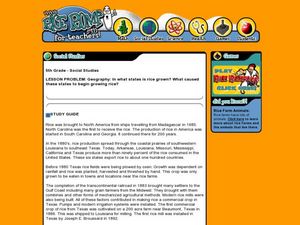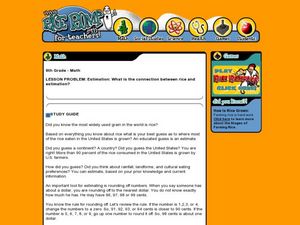Curated OER
Rice Straw
Third graders read about rice farmers and their left over straw and then draw pictures that show how they help migrating birds. In this rice straw lesson plan, 3rd graders read about how the rice farmers use their straw to help the birds...
Curated OER
Rice Plants
Second graders investigate what plant is closely related to to rice. In this rice farming lesson plan, 2nd graders dicover the parts of rice and that rice is closely related to grass. Students create a rice picture and write sentences...
Curated OER
How has rice been produced throughout history?
Fourth graders research rice history. In this rice history lesson plan, 4th graders discover the farming methods used to cultivate rice. They read about the role of rice in many cultures.
Curated OER
Where is Rice Grown?
Fifth graders create a timeline of the development of rice as an important crop. In this agricultural history lesson, 5th graders read about the history behind why rice was grown and where it is grown. Students demonstrate their learning...
Curated OER
What Is the History of the Consumption of Rice?
Sixth graders research the history of rice consumption. In this rice consumption lesson, 6th graders read a study guide and answer comprehension questions about two rice dishes and rice cultivation.
Curated OER
Nutrition: How important is rice to the world?
Fourth graders point out places on a map that grow rice around the world. In this rice growing lesson plan, 4th graders read about the importance of rice and use a map to see where it comes from.
Curated OER
Data Analysis: bird habitats in rice farms
Fifth graders make a graph and write an essay to interpret the data of birds that take advantage of habitats near rice farms. In this data lesson plan, 5th graders calculate the information given to them and interpret it in an essay form.
Curated OER
Sociology: What is life like for Gulf Coast rice farmers
Learners read 1 page about Gulf Coast rice farmers and then describe what rice farming in the U.S. is like in the United States. In this rice farming lesson plan, students tell why they would or would not want to be a rice farmer.
Curated OER
What is the connection between rice and estimation?
Sixth graders investigate estimating. In this estimating lesson, 6th graders estimate how much rice is eaten around the world. Students estimate the percentages of rice eaten by other countries. Students compare rice production to other...
Curated OER
What was the lesson learned in the story, "One Grain of Rice?"
Second graders complete activities with the folktale "One Grain of Rice." In this folktale lesson, 2nd graders discuss the lesson learned in the story. They also tell character traits of the main character Rani.
Curated OER
Cambodian New Year
Students compare and contrast the New Year celebration in Cambodia to the celebration in the United States. They mathematically determine the amount of beans added to the "mountain" during the three day celebration.
Curated OER
Days and Seasons
Introduce young scholars to calendars as they practice the days of the week and four seasons. First graders complete three days-of-the-week sequences, each starting on a different day. They can reference the completed sequence example...
Curated OER
Cultural Rituals
Fifth graders explore cultural rituals. For this cultural rituals lesson, 5th graders discover different cultures way of celebrating rice. Students gain information about festivals in the US, Indonesia, Thailand, and Japan. Students...
Curated OER
Contributions
Students taste rice, one of the Nations first people's contributions. In this contributions lesson, students discover what rice looks like, feels like and tastes like. Students make recipes using wild rice.
Curated OER
Calendar -- Months of the Year
First graders study the months of the year. They enjoy making a class book using their birthdays and the types of weather in that month. After a lecture/demo, 1st graders utilize a worksheet imbedded in this plan to design their book.
Curated OER
What sound does a duck make in the rice field?
Students discuss the sounds ducks make. For this duck lesson, students find the different reasons why ducks quack : when they are happy, to warn others of danger, for food, and when they see an enemy. They answer questions about their...
Center for Technology in Teaching and Learning
MedMyst Mission 1: Orientation at O.R.B.
A dozen years after a great plague wipes out the majority of Earth's civilization, a group of scientists joins together to fight infectious diseases. Scholars join the training mission and learn about viruses, bacteria, pathogens and...
Center for Technology in Teaching and Learning
MedMyst Mission 3: Nemesis at Neuropolis
Calling all science sleuths! A patient appears to have a disease eradicated years ago—how do you treat it? Scholars must research the illness, the possible causes, and find a cure before the disease spreads and wipes out the entire city....
Curated OER
Breaking News English: Scientists Discover Gene to Waterproof Rice
For this English worksheet, learners read "Scientists Discover Gene to Waterproof Rice," and then respond to 47 fill in the blank, 7 short answer, 20 matching, and 8 true or false questions about the selection.
Curated OER
Kodomo No Hi: Children's Day Celebration
Children's Day is a beloved Japanese holiday with many colorful and engaging traditions. On this national holiday celebrated yearly on May 5, children are honored for their strengths and given good wishes for happiness. Your younger...
Reed Novel Studies
To Kill a Mockingbird: Novel Study
Edgar Rice Burroughs was an American fiction writer whose biggest claim to fame was the creation of Tarzan. Using the novel study for Harper Lee's beloved novel, To Kill a Mockingbird, pupils research and list facts about him or another...
US Department of Agriculture
Agriculture Counts
Agricultural survey and the documentation of livestock or goods was the basis for the first written language. Youngsters discuss sorting and counting, and how these skills have been used for thousands of years. They accent their class...
Curated OER
Every Grain Counts
Students research a variety of facts about rice. They read books, access information on the Internet and use maps to determine major rice growing areas in the world and the patterns of distribution for this crop. Students create maps to...
Curated OER
What grain can tell the story of man?
First graders discuss the history of rice. In this rice history lesson, 1st graders discover who first planted rice and its role in the health of several countries today. They draw a ship loaded with rice.

























